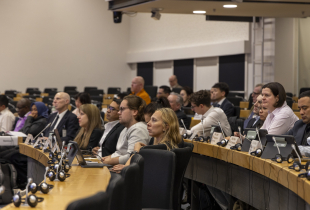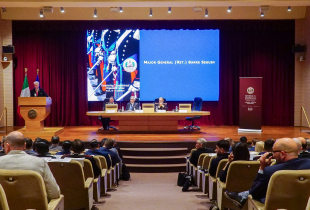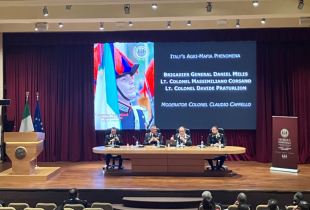
With the World in Turmoil, Transnational Organized Crime Sees Opportunity in Counterfeit Pharmaceuticals and Medical Supplies during the COVID-19 Pandemic
The coronavirus disease (COVID-19) pandemic poses a host of global health, economic, and security challenges, to include the continued challenge of combating transnational organized crime. While some believe this pandemic will disrupt and have a negative impact on the global operations of transnational organized criminal groups, the morbid reality is that these groups view the crisis as a lucrative opportunity. For the foreseeable future, we can expect organized criminal groups to quickly adapt in order to exploit the pandemic via various illicit schemes. In Italy, mafia groups are already demonstrating that they are intent on benefiting from the crime-related opportunities that the COVID-19 pandemic will present.1
There are numerous opportunities and illicit ventures transnational organized crime will seek to exploit as this pandemic runs its course. Perhaps most concerning are the activities associated with the manufacture and trafficking of counterfeit pharmaceuticals and medical supplies, including personal protection equipment (PPE).2 Since the outbreak of the crisis, the sale of these products has increased.3 Interpol is warning that one of the five global threats from the coronavirus is the fraudulent and counterfeit trade in personal protective equipment and anti-viral pharmaceuticals.4 Moreover, during this crisis counterfeiters will most probably use shortages in the supply of some products to provide counterfeit alternatives.5
The European Medicines Agency (EMA) is urging the general public not to buy medicines from unauthorized websites and other vendors aiming to exploit fears and concerns during the ongoing pandemic of COVID-19. Such products are likely to be falsified medicines.6 According to the World Health Organization (WHO), “falsified” medicines are medical products that deliberately/fraudulently misrepresent their identity, composition, or source.7 For counterfeit products, the WHO is also using the terminology “substandard” (also called “out of specification”), for authorized medical products that fail to meet either their quality standards or specifications, or both, and “unregistered/unlicensed” for medical products that have not undergone evaluation and/or approval by the National or Regional Regulatory Authority (NRRA) for the market in which they are marketed/distributed or used, subject to permitted conditions under national or regional regulation and legislation.8
Substandard and falsified medical products can harm patients and fail to treat the diseases for which they were intended.9 Their very existence poses an unacceptable risk to public health.10 They lead to loss of confidence in medicines, healthcare providers, and health systems, and affect every region of the world.11 Simply stated, incorrectly manufactured medicines present particular dangers. These types of medicines are found either to contain the wrong dose of active ingredients, or none at all, or to have a completely different ingredient included or even harmful substances that should not be in medicines.12 In other cases, the medicines may be genuine but have been stolen and then badly stored or may have expired; this means they could be ineffective or contaminated.13
While many of the illicit activities of transnational organized crime can be viewed as generally feeding a cycle of criminal activity (illicit drug use, prostitution, illicit weapons etc.), one could argue that the impact of counterfeit pharmaceuticals and medical supplies is far reaching and has greater consequences for law-abiding citizens who are not part of this illicit cycle. All types of medicines can be made in a substandard manner and falsified, from all major therapeutic categories (from “lifestyle” to “life-saving” medicines), but currently the most commonly counterfeited pharmaceuticals are antibiotics, anti-malarial and lipid-lowering drugs, painkillers, Viagra, and medications for treating depression, diabetes, and blood pressure.14 They can be found in illegal street markets, via unregulated websites, and in pharmacies, clinics, and hospitals.15 In general, people have a tendency to buy cheaper alternatives, paving the way for a large market of fake drugs.16
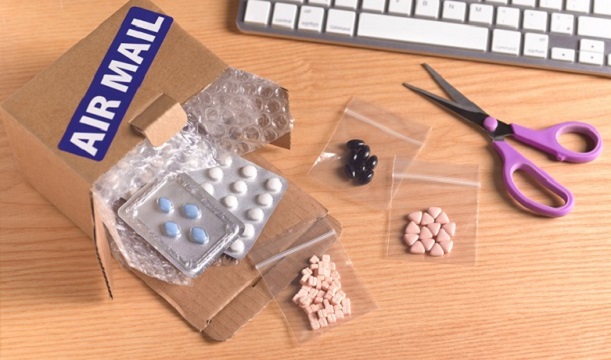
An additional complication of the current situation with the COVID-19 pandemic is that many of the legitimate precursors to make these counterfeit pharmaceuticals, as well as many of the currently counterfeited pharmaceuticals on the illicit market originate in China. China is also a primary country from which new psychoactive substances (NPS) originate and similarly production takes place either in illegal laboratories or in legal facilities owned by companies that openly produce substances that are not regulated.17
The combination of high profits and low penalties compared to other criminal activities make the illicit trafficking of counterfeit pharmaceuticals and medical supplies an attractive money-making venture for transnational organized criminal groups. The markets for fake, fraudulent, and counterfeit goods in general are estimated to be worth over $250 billion dollars each year.18 In some instances, the illegal manufacture and trafficking of counterfeit pharmaceuticals and medical supplies can be more profitable than the illicit trafficking in other activities such as illicit drugs, humans, and weapons.19
The COVID-19 pandemic provides an ideal environment for transnational criminal groups to prey on a climate of fear and the world’s hopes for a quick and effective remedy for this virus. Additionally, the dire need for medical supplies and PPE provides an opportunity for organized crime groups to counterfeit or hijack such equipment. Recently, global law enforcement agencies conducted Operation Pangea XIII, a worldwide Interpol operation that targeted 2,000 online links advertising items related to COVID-19. Of these, counterfeit surgical masks were the medical device most commonly sold online, accounting for around 600 cases. The operation resulted in the seizure of more than 34,000 counterfeit and substandard masks, “corona spray,” “coronavirus packages” and “coronavirus medicine.” Compared to a similar Interpol operation in 2018, this latest edition reported an increase of approximately 18 per cent in seizures of unauthorized antiviral medication, and an increase of more than 100 per cent in seizures of unauthorized chloroquine (an antimalarial medication) connected to the COVID-19 outbreak.20 Many of these counterfeit products do not meet adequate safety standards, thus also placing medical and emergency personnel at risk.
Once a viable vaccine or medication is found to combat COVID-19, transnational organized crime groups can be expected to quickly begin production of a counterfeit version of this remedy, placing countless lives at risk as they seek to profit and flood the market with a substandard and ineffective product. Just recently in Cameroon, counterfeit chloroquine was seized from at least 300 pharmacies and hospitals as people rush to obtain the drug in the unproven belief it can stop the coronavirus. Meanwhile, doctors and nurses from pharmacies and hospitals in Cameroon have complained that their patients were not responding to anti-malaria treatment and that they doubted the quality of chloroquine supplied to hospitals and pharmacies. A laboratory discovered that most of what was sold as chloroquine was a mixture of chalk and water.21
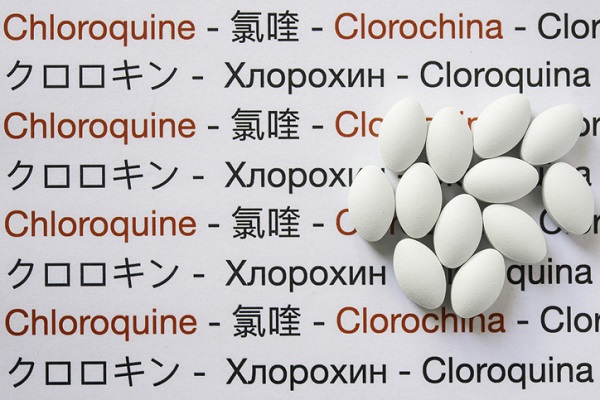
The WHO has advocated for years that strict measures are needed to prevent the manufacture, supply, and distribution of counterfeit pharmaceuticals around the globe and recommends close cooperation between various drug control and law enforcement agencies at the local and international level to ensure countermeasures are effectively implemented. Legitimate pharmaceutical manufacturers have a role in the fight against the counterfeiting of pharmaceuticals, and countermeasures are most effective when they are instituted collaboratively by the government and industry.22
The WHO argues that measures should be directed towards the effective detection of counterfeit pharmaceuticals in national drug distribution channels and the prevention of counterfeit products from entering the supply chain. While this may not fully eliminate counterfeit pharmaceuticals, it should substantially reduce the exposure of populations to the risks associated with these products.
One way in which counterfeiting can be tackled is through raising public awareness of the risks of using fraudulent medical products by using community-based, anti-counterfeit campaigns. The UNODC campaign “Counterfeit: Don’t Buy into Organized Crime” is one example of the type of awareness initiatives which should be pursued in order to mobilize the full force of consumer power against such criminal business and deprive organized crime of one of its most profitable and low-risk money sources.23 Consumers should be provided with tools to make decisions on their purchasing choices. One product that is aimed specifically at consumers is the “INTERPOL-Checkit” (I-Checkit), which provides the general public with a product verification tool to check if products are real or counterfeit.24 Under Operation Pangea XIII, INTERPOL member countries also reached out to the general public—through videos, brochures, exhibitions and talks at hospitals and schools—to raise awareness of the dangers of buying pharmaceuticals from unregulated online sources.25
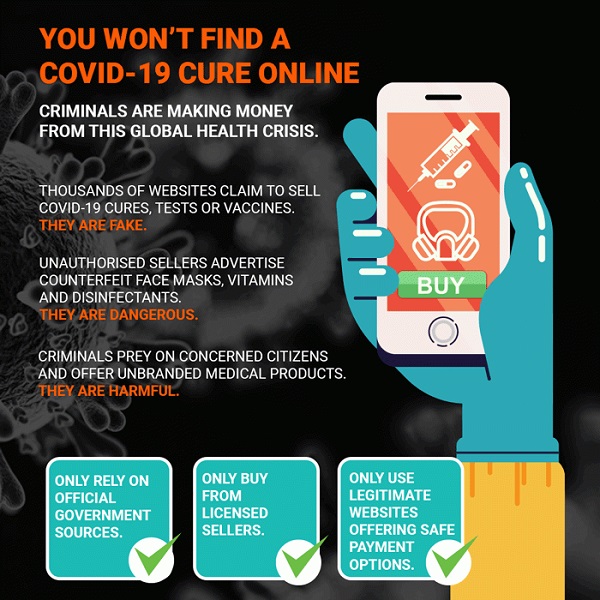
Although counterfeit pharmaceuticals are known to exist in the domestic drug distribution channels of many countries, the extent and nature of their existence in these channels are not fully understood. An assessment of a country’s current situation is therefore critical, ensuring that a clear distinction is made between substandard and counterfeit products. The WHO also recommends measures should include procedures to improve drug control systems and cooperation in enforcing existing legislation.26
One approach that would likely be most promising is the development of comprehensive plans for combating the production and distribution of counterfeit pharmaceuticals. These plans should involve a whole of government and society approach and consist of all government agencies, representatives from the pharmaceutical industry, drug importers and distributors, health professionals and associations, consumers, and supportive international, regional, and non-governmental organizations all working together. The system should include licensing/authorization of pharmaceutical products. It should also cover licensing/approval of manufacturing, importation and distribution practices and premises and adequate inspection arrangements to help counter the introduction of counterfeit products.
While this problem has been compounded by the COVID-19 global pandemic, the reality is that each country needs to develop a comprehensive national strategy based on its own situation, while taking into account the seriousness of the current global pandemic and the available infrastructure, human, and other resources at their disposal. Countries with less-developed drug regulatory systems and accompanying shortages of trained personnel and funds will most likely have difficulties. Even countries with a highly evolved drug regulatory system may find it challenging to design and implement appropriate strategies to combat this problem. States require support and guidance from international organizations and selected developed countries with experience in the field of fighting counterfeit pharmaceuticals and transnational organized crime.
In order to effectively combat the increased threat of counterfeit pharmaceutical trafficking by transnational organized crime, it is vital that each country examine their existing drug control laws for adequacy in preventing the introduction of counterfeit pharmaceuticals into their domestic drug distribution channels. If the laws are adequate, then the root causes of the existence of counterfeit pharmaceuticals should be aggressively targeted and investigated further. If the laws are inadequate, legislation needs to be quickly strengthened and revised to include provisions that would assist in the detection and eradication of these counterfeit pharmaceuticals and the transnational organized crime groups behind them.
It is the ultimate responsibility of governments to ensure that counterfeit pharmaceuticals are taken off the market and their sources found and eradicated. This should be part of an overall quality control system of every nation in order to fully address the infiltration of both the legitimate and black markets. At the national level, any difficulties and inefficiencies can be overcome by cooperation between government agencies and other involved groups. At the international level, the WHO, other United Nations organizations, nongovernmental organizations, and other interested bodies should collaborate in the detection and prevention of counterfeit pharmaceuticals. This collaboration can take various shapes and forms with the most effective measures being the timely exchange of criminal intelligence relating to transnational organized crime groups involved in counterfeit activities and initiatives such as the Interpol sponsored Pangea operations that globally target counterfeit pharmaceuticals and medical supplies. Additionally, the development of legislation that addresses transnational crimes, especially as it relates to the online sale of medications and medical equipment, can also be an effective tool in this fight.
For Academic Citation
Stephen Noguera and Kalliroi Ziavrou, “With the World in Turmoil, Transnational Organized Crime Sees Opportunity in Counterfeit Pharmaceuticals and Medical Supplies during the COVID-19 Pandemic,” Marshall Center Perspectives, no. 12, April 2020, https://www.marshallcenter.org/en/publications/perspectives/world-turmoil-transnational-organized-0.
Notes
1 “Mafia Gangs in Italy Poised to Profit from Coronavirus,” Voice of America, accessed April 10, 2020, https://www.voanews.com/science-health/coronavirus-outbreak/mafia-gangs-italy-poised-profit-coronavirus.
2 “How criminals profit from the COVID-19 pandemic.” Europol Press Release, March 27, 2020, https://www.europol.europa.eu/newsroom/news/how-criminals-profit-covid-19-pandemic.
3 Ibid.
4 “How could they? How scammers behind million-pound trade in fake coronavirus protection gear and medicine are putting lives at risk,” The Sun, https://www.thesun.co.uk/news/11365234/scammers-trade-fake-coronavirus-protection-gear-medicine/.
5 “How criminals profit from the COVID-19 pandemic.” Europol Press Release.
6 “COVID-19: Beware of falsified medicines from unregistered websites.” EMA/141955/2020, March 24, 2020, https://www.ema.europa.eu/en/news/covid-19-beware-falsified-medicines-unregistered-websites.
7 WHO, “WHO MEMBER STATE MECHANISM ON SUBSTANDARD /SPURIOUS/FALSELY LABELLED/FALSIFIED/COUNTERFEIT (SSFFC) MEDICAL PRODUCTS,” https://www.who.int/medicines/regulation/ssffc/A70_23-en1.pdf?ua=1.
8 Ibid.
9 WHO, Seventieth World Health Assembly Update, May 29, 2017, https://www.who.int/en/news-room/detail/29-05-2017-seventieth-world-health-assembly-update-29-may-2017.
10 WHO, “Substandard and Falsified (SF) Medical Products,” https://www.who.int/medicines/regulation/ssffc/en/.
11 https://www.who.int/en/news-room/detail/29-05-2017-seventieth-world-health-assembly-update-29-may-2017.
12 United Nations Office on Drugs and Crime, “The Illicit Trafficking of Counterfeit Goods and Transnational Organized Crime,” https://www.unodc.org/documents/counterfeit/FocusSheet/Counterfeit_focussheet_EN_HIRES.pdf. See also
13 “Global Operation Sees a Rise in Fake Medical Products Related to COVID-19,” INTERPOL, accessed April 10, 2020, https://www.interpol.int/News-and-Events/News/2020/Global-operation-sees-a-rise-in-fake-medical-products-related-to-COVID-19.
14 United Nations Office on Drugs and Crime, “The Illicit Trafficking of Counterfeit Goods.” See also WHO, “Substandard and Falsified (SF) Medical Products,” https://www.who.int/medicines/regulation/ssffc/en/ and WHO, Seventieth World Health Assembly Update.
15 Ibid.
16 K. Karunamoorthi “The counterfeit anti-malarial is a crime against humanity: a systematic review of the scientific evidence.” Malaria Journal 2014, 13:209, http://www.malariajournal.com/content/13/1/209.
17 Kalliroi Ziavrou, “New Psychoactive Substances: Challenges for Law Enforcement Agencies and the Law,” Marshall Center Occasional Paper 31, June 2018, https://www.marshallcenter.org/en/publications/occasional-papers/new-psychoactive-substances-challenges-law-enforcement-agencies-and-law.
18 United Nations Office on Drugs and Crime, “The Illicit Trafficking of Counterfeit Goods.”
19 Ibid.
20 “Global Operation Sees a Rise in Fake Medical Products Related to COVID-19,” INTERPOL, accessed April 10, 2020, https://www.interpol.int/en/News-and-Events/News/2020/Global-operation-sees-a-rise-in-fake-medical-products-related-to-COVID-19.
21 “Cameroon Seizes Fake Coronavirus Drugs Sold by Scammers.” Moki Edwin Kindzeka, April 03, 2020, https://www.voanews.com/science-health/coronavirus-outbreak/cameroon-seizes-fake-coronavirus-drugs-sold-scammers.
22 “WHO 1999: Guidelines to Combat and Test Counterfeit Medicines.” Global Pharma Health Fund, accessed April 20, 2020, https://www.gphf.org/en/minilab/hintergrund_testmethods.htm.
23 K. Karunamoorthi “The counterfeit anti-malarial is a crime against humanity: a systematic review of the scientific evidence.” Malaria Journal 2014, 13:209, http://www.malariajournal.com/content/13/1/209.
24 “The Illicit Trafficking of Counterfeit Goods and Transnational Organized Crime,” accessed April 10, 2020, https://www.unodc.org/documents/counterfeit/FocusSheet/Counterfeit_focussheet_EN_HIRES.pdf.
25 “Global Operation Sees a Rise in Fake Medical Products Related to COVID-19,” INTERPOL, accessed April 10, 2020, https://www.interpol.int/en/News-and-Events/News/2020/Global-operation-sees-a-rise-in-fake-medical-products-related-to-COVID-19.
26 “WHO 1999: Guidelines to Combat and Test Counterfeit Medicines.”
About the Authors
Stephen Noguera serves as the U.S. Naval Criminal Investigative Service Chair and Professor of National Security Studies in the Marshall Center’s College of International and Security Studies. Special Agent Noguera also serves as a Deputy Program Director for the Countering Transnational Organized Crime Course (CTOC).
Kalliroi Ziavrou, a 2018 graduate of the Countering Transnational Organized Crime Course (CTOC) course, is a forensic toxicologist who has been working for the Hellenic Police (Police-Major) in Northern Greece Forensic Science Subdivision since 2006. She holds a PhD in Forensic Toxicology, a Master’s degree in Chemical Technology, and a Bachelor of Science in Chemistry. In 2013, she participated in a seminar on Combating Weapons of Mass Destruction/Terrorism (CBRN) at the George C. Marshall European Center for Security Studies in Garmisch-Partenkirchen, Germany. In 2015, she served as an intern specializing in principles and practices of forensic and analytical toxicology, at the Forensic Laboratory Division of the Office of the Chief Medical Examiner of the City and County of San Francisco, San Francisco, California, USA. In 2017, she wrote an Occasional Paper for the Marshall Center on New Psychoactive Substances (NPS) as a part of the Alumni Scholar program at the George C. Marshall European Center for Security Studies. Dr. Ziavrou has published her scientific work in several international journals.
The George C. Marshall European Center for Security Studies
The George C. Marshall European Center for Security Studies in Garmisch-Partenkirchen, Germany, a German-American partnership, is committed to creating and enhancing worldwide networks to address global and regional security challenges. The Marshall Center offers fifteen resident programs designed to promote peaceful, whole of government approaches to address today’s most pressing security challenges. Since its creation in 1992, the Marshall Center’s alumni network has grown to include over 14,000 professionals from 156 countries. More information on the Marshall Center can be found online at www.marshallcenter.org.
The articles in the Perspectives series reflect the views of the authors and are not necessarily the official policy of the United States, Germany, or any other governments.
